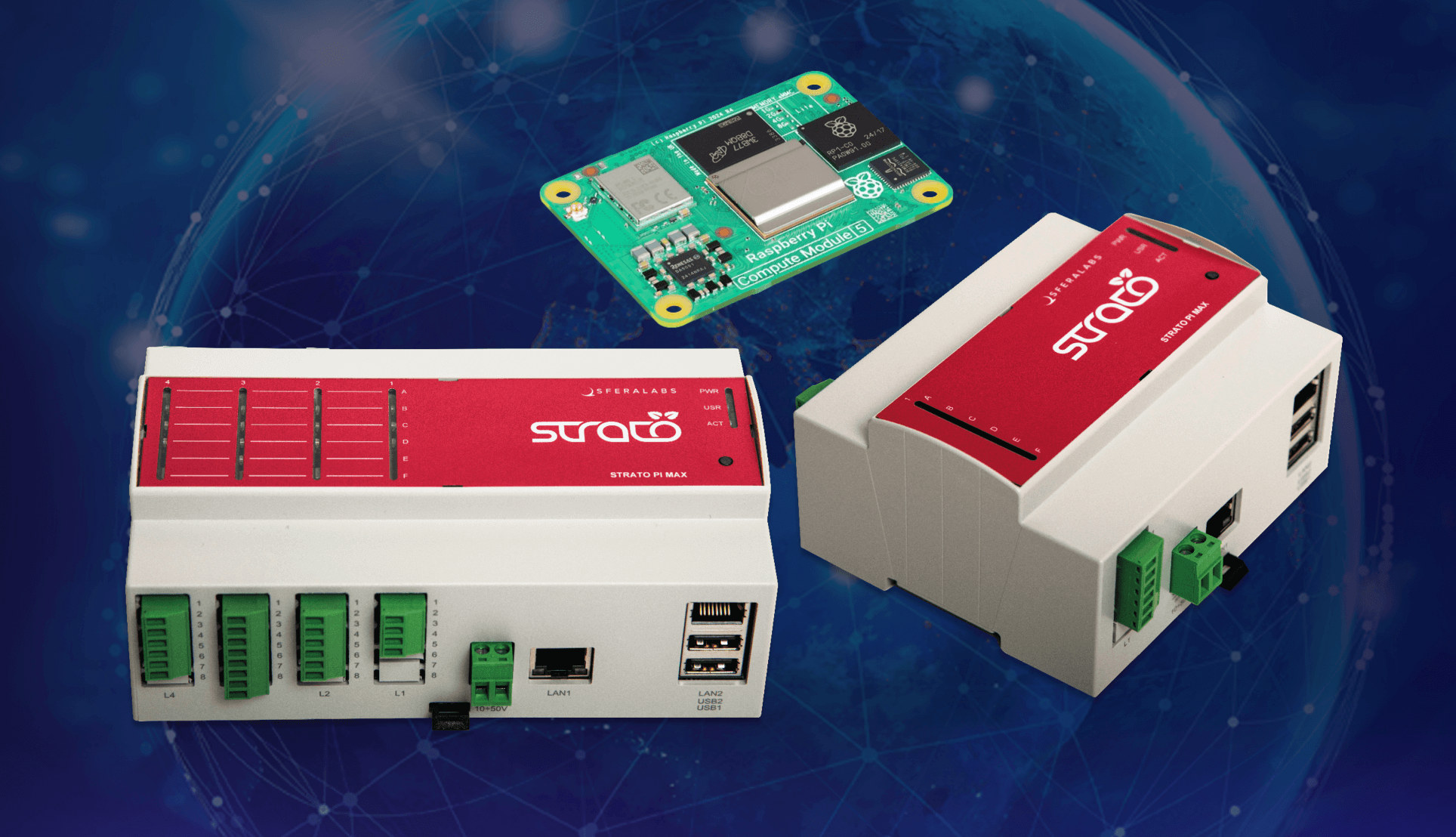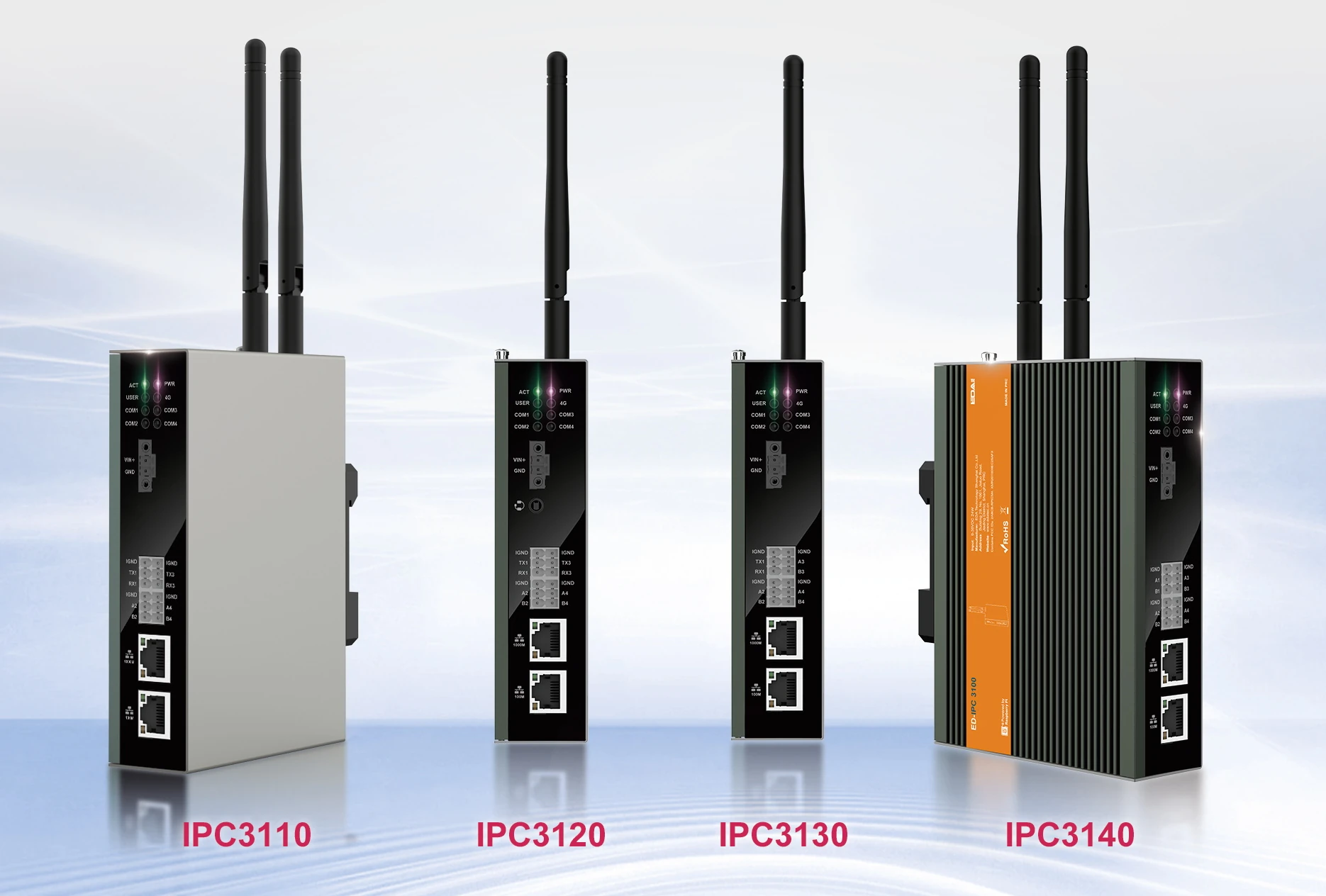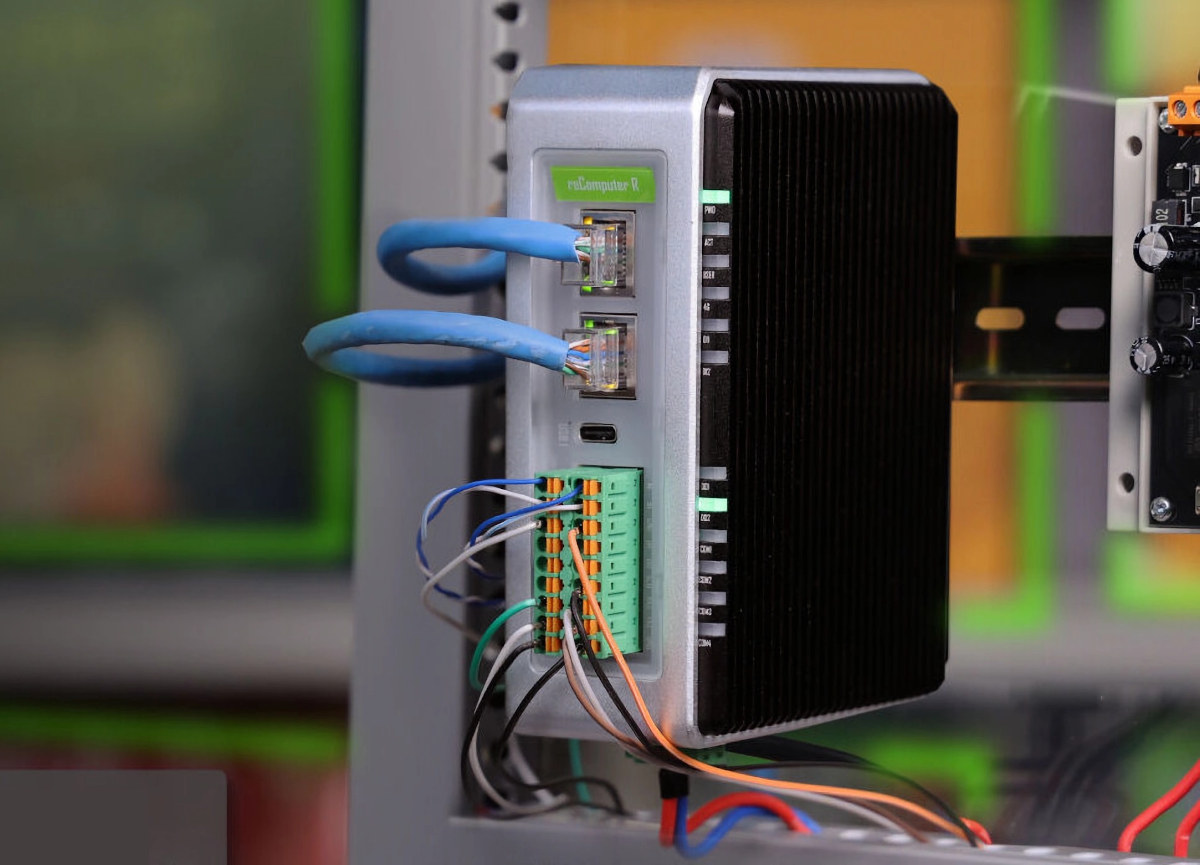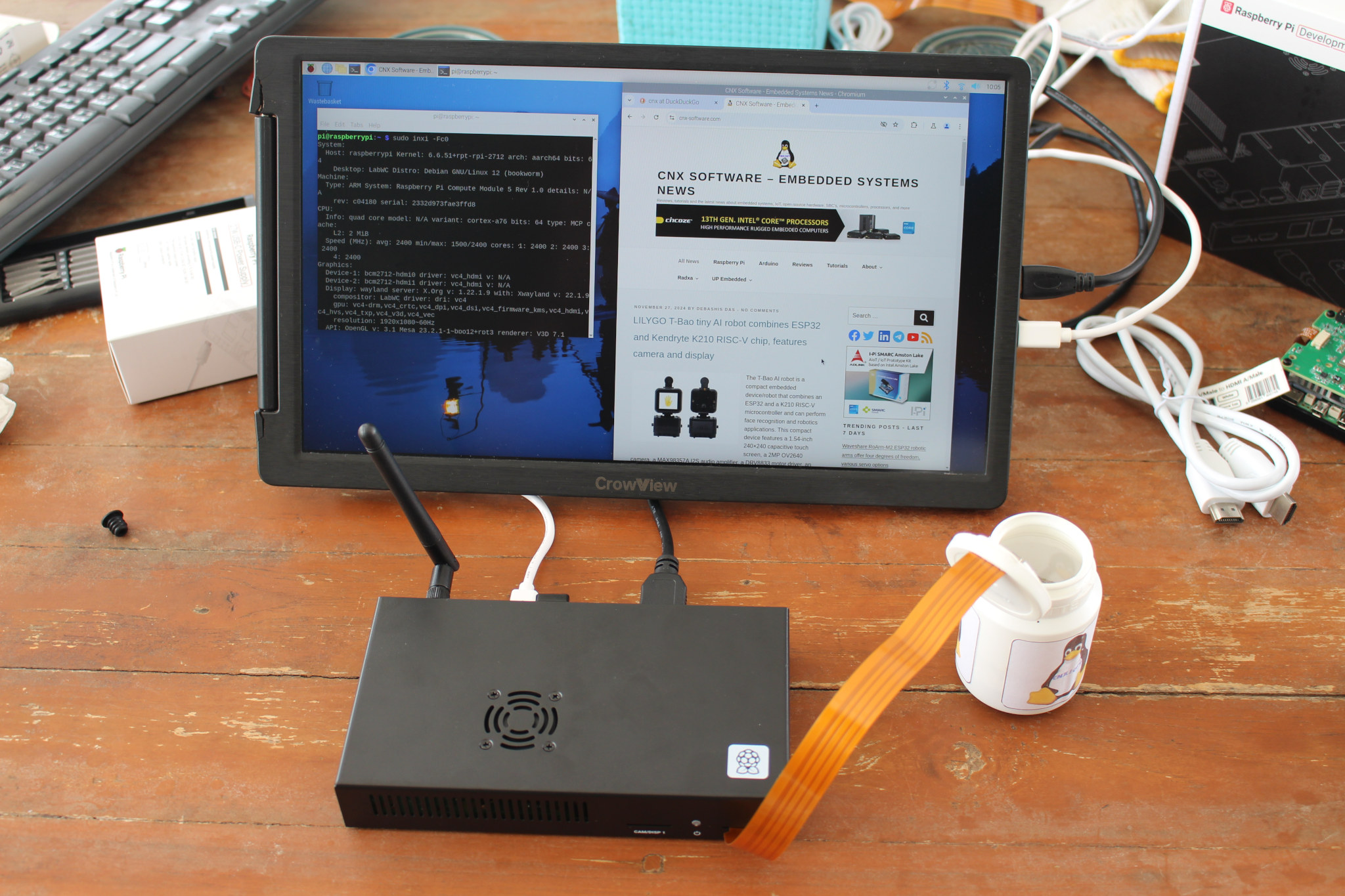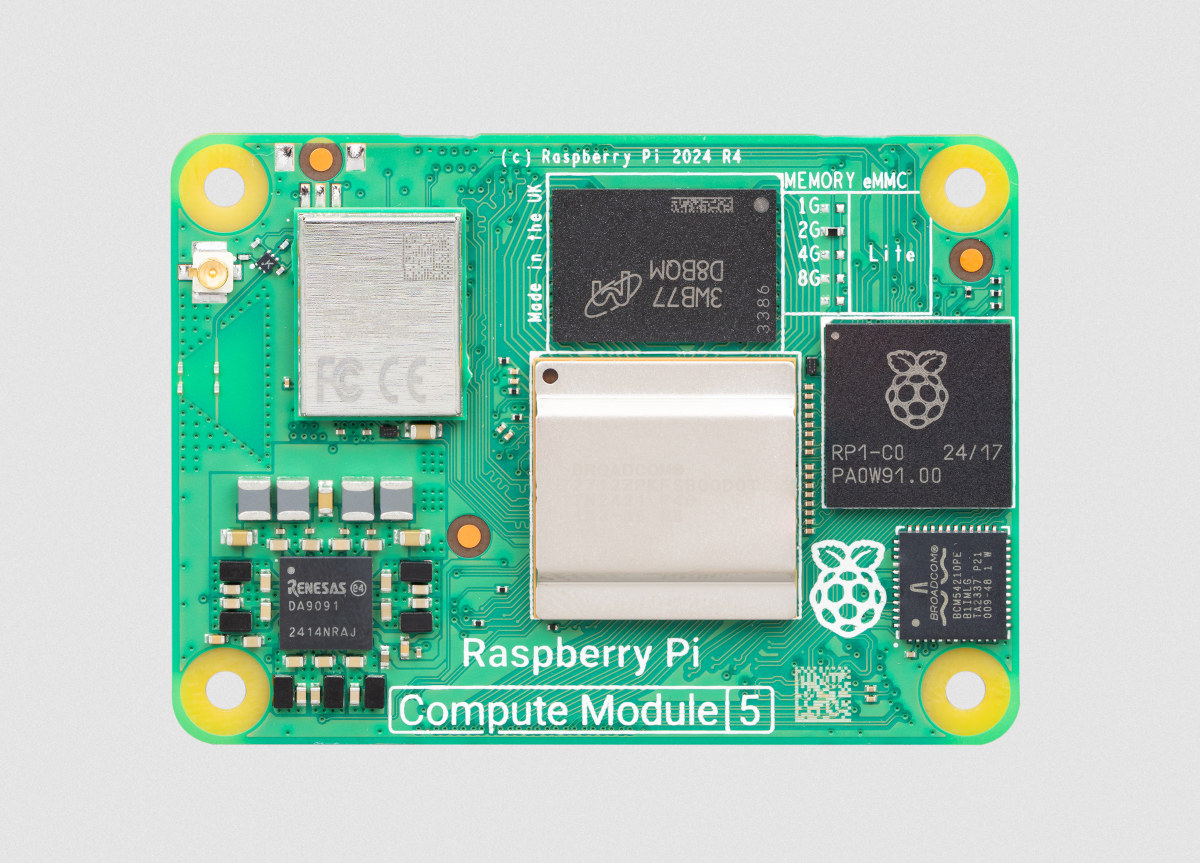The Raspberry Pi Compute Module 5 (CM5) was launched at the end of last month, and we are starting to see companies slowly announce upgraded CM4 designs. Yesterday, we wrote about EDATEC ED-IPC3100 DIN-Rail mountable industrial computers, and today, we’ll cover Sfera Labs’ addition of the Raspberry Pi Compute Module 5 to their Strato Pi Max DIN rail industrial controllers. The controllers still feature a gigabit Ethernet port, a 10/100M Ethernet port, two USB 2.0 ports, a Raspberry Pi RP2040 microcontroller for power management and boot sequence control, and support expansion modules for up to sixteen RS-485 or RS-422 ports, four CAN V2.0B ports, digital and analog I/O, and more. Strato Pi Max specifications (as of December 2024): Base Module Raspberry Pi Compute Module 5 Raspberry Pi Compute Module 4 Zymbit SCM options. Microcontroller – Raspberry RP2040 dual ARM Cortex-M0+ at 133 MHz. Storage – eMMC, microSD (dual for XL), M.2 PCIe […]
EDATEC ED-IPC3100 Raspberry Pi CM5-based industrial computers offers RS232/RS485, dual Ethernet, 4G LTE, and more
EDATEC ED-IPC3100 is a range of four DIN-Rail mountable industrial computers based on the new Raspberry Pi CM5 (Compute Module 5) with two Ethernet ports, and various RS232 or RS485 COM port options depending on the selected model. The ED-IPC3100 computers are offered with the CM5 with up to 16GB LPDDR5, 64GB eMMC flash, and optional WiFI 5 and Bluetooth 5. All also feature one HDMI port, two USB 2.0 ports, 9V to 36V DC input, and the EDC-IPC3120 model also adds a 3.5mm audio jack and internal connectors for a speaker, MIPI DSI and HDMI video output interfaces, and a MIPI CSI camera. EDATEC ED-IPC3100 specifications: SoM – Raspberry Pi CM5 SoC – Broadcom BCM2712 quad-core Cortex-A76 processor @ 2.4GHz with VideoCore VII GPU System Memory – 2GB, 4GB, 8GB, or 16GB LPDDR4-4267 SDRAM Storage – Options for 16GB, 32GB, or 64GB eMMC flash Wireless – Optional dual-band WiFi […]
Raspberry Pi 500 review with Raspberry Pi Monitor and teardown
The Raspberry Pi 500 keyboard PC is just out along with the 15.6-inch Raspberry Pi Monitor and received samples from Raspberry Pi for review a few days ago. I’ve had time to play with both, so in this review, I’ll go through an unboxing of the kit I received and report my experience with both the keyboard PC and monitor. Unboxing I received two packages. The first one with the Raspberry Pi Monitor, and the second with a Raspberry Pi 500 (UK layout), a 27W USB-C power adapter, and a micro HDMI to HDMI cable. So not quite a full Raspberry Pi 500 Desktop Kit since there’s no mouse and beginner’s manual but close to it. Let’s start with the keyboard PC. The bottom side of the package has some specs and a logo for the keyboard layout, in this case “UK”. There’s only the keyboard PC in the package. […]
Raspberry Pi 500 keyboard PC launched together with 15.6-inch Raspberry Pi Monitor
The Raspberry Pi 500 keyboard PC is now available with the guts of a Raspberry Pi 5 including a Broadcom BCM2712 quad-core Cortex-A76 SoC, 8GB LPDDR4x and a 32GB microSD pre-loaded with Raspberry Pi OS. But the company also took the opportunity to launch the 15.6-inch Raspberry Pi Monitor that was first showcased at Embedded World 2024. That means Raspberry Pi launched 22 products this year including kits, and we’re promised that would be the last launch for 2024! But Pi fans can expect a small surprise in the first half of January… Raspberry Pi 500 keyboard PC Raspberry Pi 500 specifications: SoC – Broadcom BCM2712 CPU – Quad-core 64-bit Arm Cortex-A76 processor @ 2.4GHz GPU – VideoCore VII GPU with support for OpenGL ES 3.1 graphics, Vulkan 1.2 VPU – 4Kp60 HEVC decoder System Memory – 8GB LPDDR4X-4267 SDRAM Storage – 32GB microSD card preloaded with Raspberry Pi OS […]
reComputer R1113-10 industrial IoT gateway offers isolated RS485, RS232, DI, DO, and dual Gigabit Ethernet
Seeed Studio has launched the reComputer R1100 series industrial IoT gateway family based on Raspberry Pi CM4. The first model, the reComputer R1113-10, is powered by a Raspberry Pi Compute Module 4 module with 2GB RAM and 8GB eMMC storage. It includes two isolated RS485 ports, two isolated RS232 ports, DI and DO interfaces, and twelve LED indicators. Additional connectivity options include dual Gigabit Ethernet ports, Wi-Fi, Bluetooth 5.0, LoRa, 4G LTE, and Zigbee. The device also features two USB-A 2.0 ports, a USB-C 2.0 port for OS flashing, an HDMI 2.0 output, and a MicroSD card slot. There are many such industrial IoT gateways based on Raspberry Pi CM4 and other SoMs or SoCs on the market, and we covered a bunch including the Compulab IOT-DIN-IMX8PLUS, Digi IX40, Dusun DSGW-380, Cytron IRIV PiControl, and Robustel EG5101 and EG5200, among others, each with their own unique set of features. reComputer […]
A first look at the Raspberry Pi Development Kit for CM5
Raspberry Pi has just launched the Compute Module 5 (CM5) and the company sent me a “Raspberry Pi Development Kit for CM5” for review and to play around with the new Broadcom BCM2712 system-on-module succeeding the Raspberry Pi Compute Module 4 (CM4) introduced in 2020. Today, I’ll have a first look at the development kit checking out the hardware, connecting accessories, booting it up to Raspberry Pi OS, and collecting some basic system information. I’ll do a more in-depth review in a few weeks. Unboxing of the Raspberry Pi Development Kit for CM5 I received the kit in a package reading “Raspberry Pi Development Kit” and “For Raspberry Pi CM5”. That’s a good start… The bottom side lists the package’s content which I will check out shortly, and a link to the documentation. Let’s see what we have with the Raspberry Pi Development Kit: a Raspberry Pi IO Case, a […]
Raspberry Pi CM5 launched with Broadcom BCM2712 SoC, up to 16GB LPDDR4 ECC memory
The Raspberry Pi Compute Module 5, or Raspberry Pi CM5 for shorts, is now available with up to 16GB LPPDR4 ECC memory, up to 64GB eMMC flash, and an optional WiFi 5 and Bluetooth 5.0 LE wireless module. It has the same form factor as the Raspberry Pi CM4 and CM4 Lite launched in 2020 but delivers a significant performance boost. The Raspberry Pi CM5 is basically a tiny version of the Raspberry Pi 5 SBC designed for embedded applications with a Broadcom BCM2712 quad-core Cortex-A76 SoC, and offered with 2GB to 16GB RAM, optional 16GB to 64GB eMMC flash, and optional WiFi 5 and Bluetooth 5.0 module. As usual, there are also Raspberry Pi CM5 Lite versions without any eMMC flash meant to be booted from a microSD card or an SSD on the carrier board. Raspberry Pi Compute Module 5 Raspberry Pi CM5 specifications: SoC – Broadcom BCM2712 […]
Clipper HAT Mini – A Raspberry Pi 4G LTE pHAT with Qwiic/STEMMA QT connector
Pimoroni Clipper HAT Mini – also called “CLIPPER LTE Mini HAT” – is a Raspberry Pi 4G LTE pHAT that can use mobile data for remote projects where WiFi connectivity is unreliable or unavailable. The HAT is built around a SIMCom A7683E LTE Cat 1 modem with support for frequency bands B1/B3/B5/B7/B8/B20/B28, offering uplink speeds up to 5 Mbps and downlink speeds up to 10 Mbps. Other key features of this HAT include a SIM card slot, an SMA antenna connector (antenna sold separately), two user buttons, indicator LEDs, and a Qwiic/STEMMA QT connector for I2C modules. The board is designed to attach to Raspberry Pi (Zero) via a pre-soldered socket header and includes introductory global data coverage via a 1NCE SIM card. These features make this device suitable for IoT projects, mobile data collection, and remote-controlled devices in varied environments. Raspberry Pi LTE 4G HAT Specifications Compatibility – Supports […]


